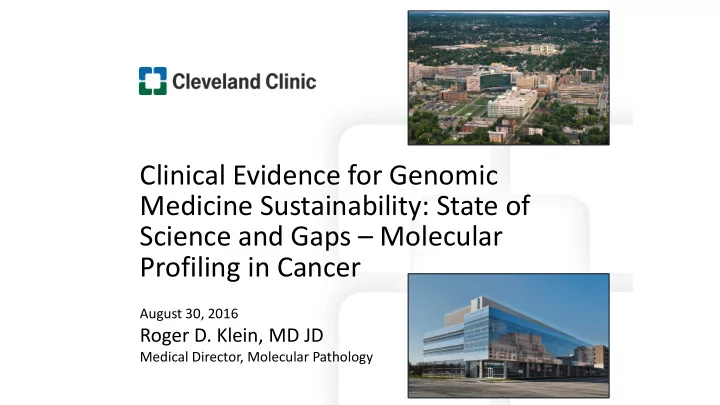

Clinical Evidence for Genomic Medicine Sustainability: State of Science and Gaps – Molecular Profiling in Cancer August 30, 2016 Roger D. Klein, MD JD Medical Director, Molecular Pathology
Precision Medicine Response Diagnosis to Therapy Prognosis Side Effects ‘The right drug, for the right patient, at the right dose, at the right time’ PRESENTED BY: Roger D. Klein, MD JD, Cleveland Clinic
Traditional Analysis • Tumor type and marker specific • IHC, ISH, PCR • Single or small number of markers • Highly specific, limited information PRESENTED BY: Roger D. Klein, MD JD, Cleveland Clinic
HER2 (ERBB2) PRESENTED BY: Roger D. Klein, MD JD, Cleveland Clinic
PRESENTED BY: Roger D. Klein, MD JD, Cleveland Clinic
Changes affect pathways involved in regulation of cellular growth, differentiation, senescence, and cell death (apoptosis)
Next Generation Sequencing PRESENTED BY: Roger D. Klein, MD JD, Cleveland Clinic
PRESENTED BY: Roger D. Klein, MD JD, Cleveland Clinic
PRESENTED BY: Roger D. Klein, MD JD, Cleveland Clinic
NGS in Oncology Practice • Diagnosis - help identify tumor vs. benign - tumor subtypes • Appropriate targeted therapy • Identification of resistance mutations - primary - secondary • Off-label use and clinical trial selection PRESENTED BY: Roger D. Klein, MD JD, Cleveland Clinic
Use of NGS in cancer • Use of NGS in has resulted in discovery of large numbers of mutations with potential prognostic and therapeutic relevance - many genes overlap different cancer types - germline variants must be distinguished • Translation into useful clinical test requires ability to - accurately and reproducibly detect variations - meaningfully interpret results - effectively communicate results PRESENTED BY: Roger D. Klein, MD JD, Cleveland Clinic
Questions in Interpretation • Is the mutated gene potentially relevant to the patient’s management? - if so, in what way? • Is the particular variant potentially relevant to the patient’s management? - If so in what way? • Is it of the type that appears to respond to therapy, impact prognosis, or aid in diagnosis? PRESENTED BY: Roger D. Klein, MD JD, Cleveland Clinic
PRESENTED BY: Roger D. Klein, MD JD, Cleveland Clinic
PRESENTED BY: Roger D. Klein, MD JD, Cleveland Clinic
PRESENTED BY: Roger D. Klein, MD JD, Cleveland Clinic
PRESENTED BY: Roger D. Klein, MD JD, Cleveland Clinic
PRESENTED BY: Roger D. Klein, MD JD, Cleveland Clinic
PRESENTED BY: Roger D. Klein, MD JD, Cleveland Clinic
PRESENTED BY: Roger D. Klein, MD JD, Cleveland Clinic
PRESENTED BY: Roger D. Klein, MD JD, Cleveland Clinic
PRESENTED BY: Roger D. Klein, MD JD, Cleveland Clinic
PRESENTED BY: Roger D. Klein, MD JD, Cleveland Clinic
Recommend
More recommend